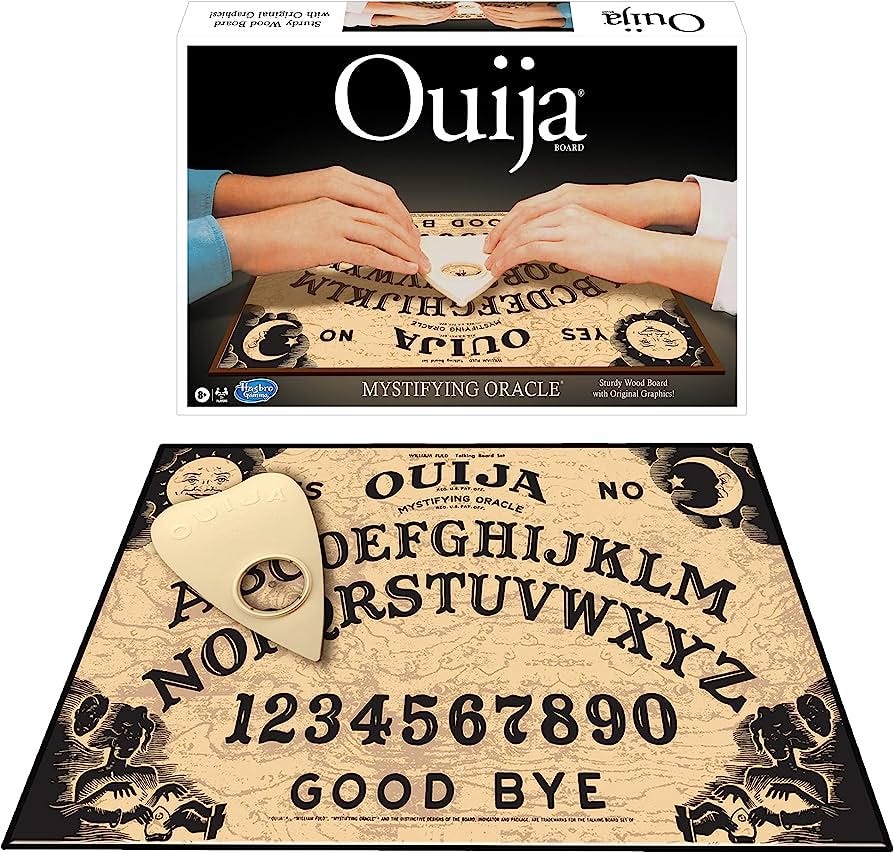Howdy y’all,
It’s my birthday this week! Hence the delayed post.
I received a gift that sent a cold pang of adrenaline through my body: a ouija board. My friend smiled nervously when he saw me open it. He knew I was on a questioning journey, but was worried this gift was too far. These sorts of things were absolutely taboo for us growing up. It was common to hear our church and school friends talk about scary movies, “I can handle monsters, but not demons, because I know that stuff’s real!” Even my atheist friends are spooked by ouija boards!
“The thing is,” he said, “We don’t know how these work. We know it’s an ideomotor phenomenon. So you’re not really trying to communicate with anything that isn’t already inside of you. That’s not to say it’s not scary. The scary thing is how many and what sorts of things are already inside of you? Would it be scarier to communicate with them or to leave them alone in the dark?”
I remember listening to Christian radio dramas as a kid where teenagers would pressure each other into drinking or drugs or seances, ultimately leading everyone to spiritual ruin except for the faithful abstainer. My friend’s explanation sounded like one of those scripts, but in his voice was a sincerity and nervousness that I had never heard in one of those recordings. He was scared too, but sincerely curious.
Associate Director of Communication, Sam Neves, recently published a piece on using AI for sermon-writing. What would make this any different?
So we tried using the ouija board as a sort of religious experiment, a gonzo theology.
We had Angel Olsen playing, my wife working on her computer as my friend and I sat at the coffee table— The board was cheap but sturdy with lurid illustrations of ethereal men whispering into a woman’s ear (very solomonic). The alphabet was stretched out in a curve with an array of numbers. In opposite corners was a YES and a NO. The planchette was a cheap piece of plastic. I used to think this was a dark and evil device, but I realized it was just an overpriced board game. Why do we assume the devil is better at speaking to us through games than God?
“Is anyone there?” I asked… Our fingers started moving the planchette. We breathed, trying to let go of an agenda, like you do in your best prayers.
S T O P Y O U R M E L U M
At that point I stopped, thinking that we were just getting gibberish, but my friend wanted to try again. We read aloud,
U 3 P J 3 7
Then the planchette moved to NO. We stopped and leaned backed, a little disappointed. Angel Olsen’s voice crooned over an electric guitar. I googled “melum”— latin for hymn. Someone didn’t like the music, I guess.
At my birthday party, this same friend convinced a small group to try the ouija board in a separate room. I joined and put a finger on the planchette.
Honestly, the hardest part to watch was everyone trying to communicate between each other. “What should we ask? Who wants to do the talking? Who has something to ask?” I didn’t really have a plan and everyone seemed confused as to how to start.
Finally, someone asked, “What’s your name?”
V A I N
After a moment’s silence, someone asked. “Do you have a name?”
NO
After that, the responses were nonsensical— numbers and letters like a license plate or a spectral wifi password. We tried to speak to two relatives’ aunt by name. They tried to ask their aunt what her favorite food was, to test if they were actually speaking to her. The planchette didn’t spell anything coherently and the relatives didn’t even remember the same meal. The planchette moved slower than before but the responses were incoherent and we were getting bored.
Someone tried to speak to their dog. More indecipherable number letter combos. “Honestly, that’s just like Wally.” We all laughed and smiled and felt like that was the most conclusion we could hope for.
And that was it, the end of the seance! We’re raised to anticipate instant results, instant voices of demons trying to trick us that we’re speaking to our deceased loved ones, but the results weren’t so dramatic.
Of course, we did seem to receive a couple of signals that seem like they came from something else. We didn’t know the latin word for hymn. I didn’t think we’d interact with something Nameless. As a response, the word “vain” did feel… alien.
I still believe there’s something about the ouija board that could be powerful. But I can’t think of any logical reason why it should be considered anymore evil than AI or prayer or music or playing cards? Is there any argument against ouija boards that isn’t, at the crux of it, aesthetic?
Further research is needed. What should I ask next?
Thanks for reading.





